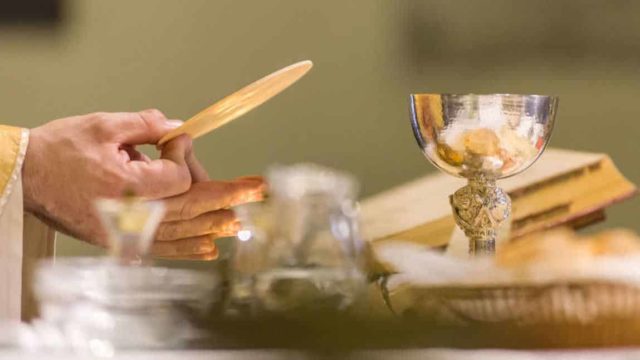Monsignor Francis V. Cilia
The Valley Catholic – March 25, 2020
What is the Catholic response to our present experience of “sheltering in place?”
Perhaps the better question is this: “How can we preserve communion when most are denied the celebration of the Mass and the reception of Holy Communion?”
These are indeed days like most of us never thought we would live to see. For all of our lives, the one indispensable mark of being Catholic has been weekly, or even daily, celebrations of Mass, culminating with reception of the Eucharist, so often referred to as “the source and summit of Christian life.” We have been taught that “Eucharist makes the Church.” And now, 11,000,000 Catholics in California, the entire country of Italy, and so many more of the faithful throughout our nation and world do not have access to the celebration of Mass, except virtually, through the Internet, where we can benefit from “spiritual communion.”
Our Lent has become a time of a new kind of “Eucharistic fast.” And for many, this is extremely painful. How, then, can we remain “in communion” without Communion?
To answer this question, it is good to remember that in the Eucharist, we share communion, and we are united with the Lord in Holy Communion. We also are called to be “in communion” with one another, that is, not only with those who are present in the Eucharistic assembly with us at any given Mass, but with all believers – wherever they are – who celebrate the Eucharist. We pray in the third Eucharistic Prayer “that we, who are nourished by the Body and Blood of your Son and filled with his Holy Spirit, may become one body, one spirit in Christ.”
The bonds of communion are seen and strengthened in Christian living, which is marked by the life of each person, family, and community, who attempt to follow the Lord Jesus’ command to love one another in the same way that He loves us. They also are shown by care for the poor, the underprivileged, and indeed, all who are in need. Our communion is demonstrated by works of mercy, forgiveness, and peace.
Coming as they do during the season of Lent, we can make these days a real time of prayer, penance, and almsgiving. We can focus not on some external reality, but on the lived experience of those who suffer, who live in fear, and even those who succumb to COVID -19. We can and should pray for them and for all who are laboring to help them.
When we fast from food, or drink, or anything else, we are usually eager to return to them, once Easter has come. This year, our fasting may necessarily last longer than the 40 days of Lent. If “absence makes the heart grow fonder,” how much more will we long for a return to the Eucharist, the Bread of Life and the Cup of Salvation? It is my suspicion that even some who do not often join us in our weekly celebrations may find new consolation in the Mass, when we are again allowed to celebrate publicly. At least that is my prayer.
Finally, I suggest that the readings these Sundays of Lent, particularly the Third, Fourth and Fifth Sundays, might offer us newfound hope. To the Samaritan woman at the well, Jesus gave Living Water; the man who was blind from birth is given sight by the One who is the Light of Life; in the raising of Lazarus, Jesus shows Himself to be “the Resurrection and Life.”
We desperately need the hope that is rooted in the Lord who is Living Water, Light of Life and Resurrection and Life, for this alone can renew us in our faith, our hope and our love. As we hear so often on newscasts these days, we are here for each other, we are in this all together, and we are: religious, lay, clergy, old and young. May the Lord strengthen us, keep us in communion with one another and with all people of good will, and may He heal and raise up all who are bowed down.

